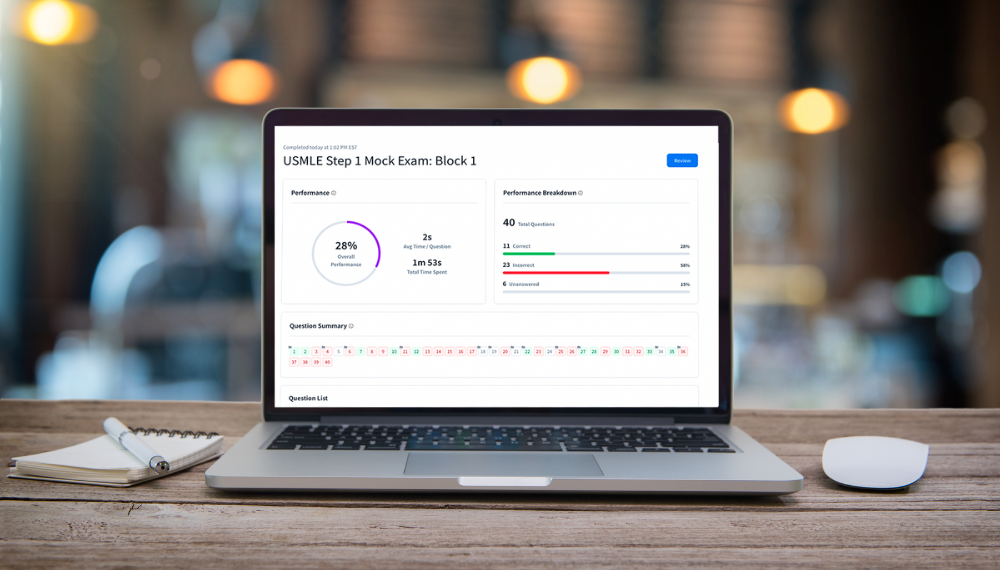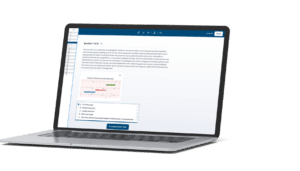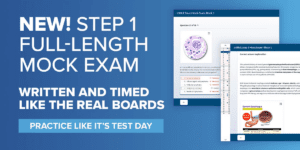Why Take a Step 1 Mock Exam (Even Though It’s Pass/Fail)?
- by
- Mar 05, 2024
- Reviewed by: Amy Rontal, MD

In 2022, the USMLE altered the very fabric of the first two years of medical school by changing Step 1 to pass/fail.
While this change has been embraced by many med students, this doesn’t mean that Step 1 is no longer important, or that you don’t need to thoroughly prepare for the exam! If anything, it’s just the opposite, as the foundation you build upon for Step 1 will ultimately affect your Step 2 performance, and so on.
To help you prepare for Step 1, Blueprint just launched a full-length Step 1 mock exam to help you simulate your test experience before the big day, featuring 280 questions that match USMLE®’s topic distribution for Step 1. In this post, we’ll tell you what’s in it, how you can use it to pass Step 1, and set yourself up for a successful medical career!
Get ready to pass with Blueprint Med’s newest USMLE resource, our full-length Step 1 Mock Exam! Assess your skills and perfect your exam strategy with the most realistic mock exam that gives you the Step 1 experience. Get started today for just $49!
Why You Still Need to Prepare for Step 1
First, let’s discuss the importance of Step 1 prep in general. With the changes that have taken place, why does preparing for the exam matter more than ever?
Even though Step 1 is now pass/fail, studying hard for the test is as important as ever. This is true for several reasons. First and foremost, under-preparing could put you at risk of failing Step 1, which is a huge obstacle that can be a setback to your medical career. The Step 1 pass rate has been declining in recent years, so it’s important that you still make sure you’ll pass!
Additionally, the testing skills and knowledge necessary to pass will be extremely valuable throughout your clinical years, when prepping for Step 2 and Step 3, and on your in-training exams as a resident.
Finally, the discipline, critical thinking, and medical knowledge base you acquire as a result of Step 1 preparation can help shape you into the best physician you can be. The sooner you begin this journey, the better it will be for your career!
The Importance of Mock Exams
Beyond question banks, videos, and textbooks, mock exams are one of the best tools in your arsenal to help prepare you for Step 1 and other standardized tests.
The goal of test prep is to reduce the number of surprises that can occur during the real exam. Just as we practice for sports, music performances, surgeries, and other things, mock exams help you acclimate yourself to the testing experience.
Additionally, mock exams give you an objective measure that tracks your progress through your studies and allows you to build your endurance for test day. They also make it possible to identify weak points in your knowledge, so you know where to focus your study efforts.
Why Use a Step 1 Mock Exam?
1. It’ll help you strategize.
Taking a Step 1 mock exam will give you a very good sense of where you’re at in your studying. You can be confident in this assessment because the questions are representative of what you’ll see on Step 1, and the testing interface is very similar to the USMLE platform.
In other words, the high validity of the mock exam will help you craft a good overall strategy for tackling Step 1. It’s best to do this as early as possible, so you’ll have plenty of time to prepare.
2. It’s great for identifying areas that need review.
Taking the mock exam will give you a sense of where you need help and what you should be focusing on. The earlier you do this the better, since it’ll give you more time to drill down on topics that need further attention.
You can use the extensive exam metrics to see where your weaknesses are, how you’re doing compared to the national average, and what kind of progress you’re making.
Utilize the detailed explanations of both correct and incorrect answers to gain an understanding of key concepts you may be struggling with.
3. Use your results to create a study plan.
You can use your free Blueprint Med School Study Planner to create a day-to-day study schedule. Use the results from the Step 1 mock exam to map out your study plan, with a special emphasis on topics that need further review.
By using the study planner, you’ll know exactly what to study each day, and you can rebalance your schedule with the click of a button!
4. Get expert support!
Finally, if you’re having trouble with a question, one of our standby physicians will provide you with expert support. They’ve all been exactly where you are and they have expertise in even the toughest topics.
You can be confident they’re giving you the proper guidance and setting you up for success on Step 1.
How to Use Blueprint’s New Mock Exam to Prepare for Step 1
What’s Included
So, let’s dive into what’s included in the new Step 1 Mock Exam from Blueprint!
Assess your skills and perfect your exam strategy with the most realistic mock exam that gives you the Step 1 experience:

- 280 total NBME®-formatted questions with explanations
- Full length! 7 blocks, 40 questions each (just like the real thing)
- Matched to USMLE®’s exam topic distribution
- Personal analytics to identify your weaker areas
Plus, you’ll be taking the exam in a realistic interface that looks like the actual Step 1 exam!
Tips for Taking a Step 1 Mock Exam
In terms of how to actually integrate our mock exams into your study plan, I’m a strong proponent of maximizing the number of questions you do and the number of mock exams you take. The goal is approximately one mock exam a week to keep consistent track of your preparedness.
The setting in which you take your mock exam is just as crucial as going through the questions themselves. Find the best testing location you can. Some examples are a classroom at your school, a quiet room at a library, or a separate room in your house. Take the mock exam at a desk with a desk chair like you will on test day.
Additionally, start your Step 1 mock exam at the time you’ll start your actual test, and take breaks just as you would on test day. Go to the bathroom, grab a granola bar, drink some coffee, and return to the test. Steer clear of taking the test in bed, on the couch, with a TV show on, or music playing.
Finally, do each mock exam in one session. Don’t spread it out across several days or take breaks longer than what you’ll have on exam day.
Further Reading
Preparing for Step 1 is a daunting task. There are many ways to study, but every successful study plan should include mock exams to make sure you’re really ready. Our new Step 1 mock exam is a great resource you can use to get your career on the right track!
Keep at it and remember that you deserve to be here and deserve to be a doctor. Step 1 is just another test, and with the right preparation you’ll be able to conquer it with ease!
Looking for more (free!) tips to help you prep for Step 1? Find more posts from Blueprint tutors on the Med School blog:
About the Author
I am a graduate of the Ohio State University with a degree in Neuroscience as well as a minor in clinical Psychology. I am currently a research coordinator at University of Pittsburgh Medical Center prior to beginning residency. I am attending the University of Pittsburgh Medical School for my MD. I am interested in the field of Orthopaedics as well as medical education, healthcare reform, and various advocacy groups. I focus on questions/testing strategy as well as taking what you learn from a book and applying it to test questions. Twitter: @LCluts










